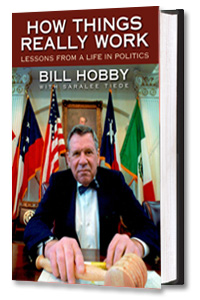One of the more cynical ideas to be floated around the country is the now much-talked about idea of limiting the number of terms state and federal legislators can serve.
The idea is largely a Republican one, born of the fact that, while the GOP has recently been very successful in electing Presidents, it has not done particularly well at electing legislators. Except for the post-Watergate Carter term, Republicans have been in the White House for a generation now, but have recently lost ground in Congress and in state capitols.
In the 1930’s and ’40’s, when the GOP could not elect a President, but could occasionally muster a majority in one house or the other of Congress, Republicans supported and enacted our two-term limit on Presidential terms. In today’s climate, Republicans have talked about trying to repeal the Presidential limitation and imposing a Congressional one.
Fortunately, the trend seems to be going the other way. Texas and a number of other states have recently moved from two- to four-year terms for their governors. At least two states, Georgia and North Carolina, have repealed or modified one-term limitations on their governors.
The idea of legislative term limitation is cynical because it assumes voters are not smart enough to know what is good for them, their state and nation.
It also would have an effect that its advocates presumably would not like. People who like to call themselves “conservatives” however radical they are in fact) generally seem to dislike and distrust what they call “the bureaucracy” even more than they do the elected officials they are trying to get rid of.
But an inevitable result of constant turnover among elected officials would be an increased reliance on staff members (bureaucrats).
The fact is that public officials, like intelligent people in responsible positions in any walk of life, learn from experience. All legislatures work, to one degree or another, on the basis of seniority. Seniority has good points and bad ones. One of the good points is that committee chairs and others in policy-making positions tend to have the judgment that is at least partly conferred by experience.
Occasionally people get elected to office determined to save the world. A (modified) system of seniority at least attempts to ensure such folks can’t do any real damage until they have had time observe that the world has stubbornly resisted saving for several thousand years now.
The fact is that a legislator has to have served a few terms before he or she masters the legislative process and the subject matter of whatever area of public policy the legislator has specialized in. It is only after an pprenticeship that congressional leaders like Lloyd Bentsen, Phil Gramm, Jake Pickle, and Jack Brooks can make their contributions
That is not to say that every long-time legislator is an effective, contributing member of the body in which he or she serves. But a legislator can hardly be effective without the experience. In any case, that’s up to the voters to decide.
And they decide by re-electing many legislators, stubbornly ignoring best efforts of elitists to tell them what is best for them.
Last November’s Congressional elections were our most recent example. Only one United States Senator was defeated.
One writer called term limitation the political equivalent of cold fusion.
Still, the polls and the election returns are sending mixed messages. Seventy-seven percent of the November voters interviewed in a national exit poll said they disapproved of the job Congress is doing. Almost as many (70%) favored limits on the number of years a member can serve.
Limits on state legislative terms passed in Colorado, California, and (earlier) in Oklahoma.
But two thirds of those who favored a term limitation voted for the incumbent. And the most revealing fact of all is that or the fourth election in a row, more than 95 percent of the congressmen who ran for re-election were re-elected. Indeed, 404 of the 405 congressmen who ran for re-election won their primaries.
One of this country’s ablest political observers, David Broder of the Washington Post, is usually sympathetic with anti-incumbent sorts of ideas. But Broder, writing on the management of the Persian Gulf crisis, reflected on the long governmental service of President Bush, Defense Secretary Cheney, Joint Chiefs Chairman Powell, House Speaker Foley, Senate Majority Leader Mitchell, and concluded that he is “grateful that it is the grown-ups who are making the tough calls in this situation.”
Amen.
This country would doubtless not have had the services of Sam Rayburn as Speaker, or those of Lyndon Johnson as Senate Majority Leader, Vice-President, or President under a term limitation scheme.
President Bush, a veteran of 24 years of Federal service, has endorsed term limitation. Where does he think we should get our future Presidents? Not, apparently from a group of men and women seasoned, like himself, by years of public service. Or, for that matter, like his father Prescott Bush, who ably represented Connecticut for many years in the United States Senate.

